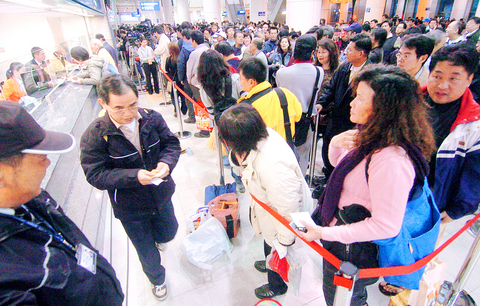Thousands of people flooded into the eight stations of Taiwan High Speed Rail Corp (THSRC) for the first day of ticket sales yesterday, but frequent malfunctions in the booking system made a lot of people unhappy.
With official operations set to begin on Friday, THSRC began selling tickets yesterday for the first 10 days of operation.
Ticket counters opened at 6am.

PHOTO: LO PEI-TER, TAIPE TIMES
To encourage more people to try the new rail system, the company announced last week that it would offer a 50 percent discount on the fares for the test runs and would also sell 50,000 commemorative tickets.
Apparently attracted by the reduced prices or the novelty of the new rail system, people started to line up in front of the ticket booths at every THSRC station on Monday evening in the hopes of being among the first passengers of the nation's first north-south high-speed railway.
The line will run between Banciao (板橋), Taipei County, and Tsoying (左營) in Kaohsiung City.
A standard ticket between Banciao and Tsoying costs NT$1,460 (US$45) for an economy-class seat and NT$2,390 for a business-class seat.
But the patience of those in line was sorely tested yesterday by frequent errors in the booking process, including malfunctioning vending machines and credit-card machines.
Some people complained that it took 20 to 30 minutes to purchase one ticket.
Others were upset that the vending machines only returned coins, not bills.
THSRC executive director Ou Chin-der (
He said the company had not expected the huge volume of bookings, which caused the system to crash.
"We expect to sell 30,000 tickets a day ? obviously we underestimated demand," Ou said.
Minister of Transportation and Communications Tsai Duei (蔡堆) visited the Banciao station and was not happy with what he saw.
"The high speed rail is such an advanced system, but its ticketing system is so backwards," he said.
Tsai said that regardless of the reason for yesterday's snafus, THSRC needed to find the problem and resolve it immediately.
He said that there was no excuse for such errors.
As of 8pm, THSRC said it had sold 81,168 tickets.
Ticket booths were scheduled to remain open until 10pm, but the company decided to close the lines in the afternoon to help ease congestion in the stations.
Company officials decided not to accept ticket requests from anyone who arrived at the Banciao Station after 2:30pm and later instituted similar measures at the other stations.
THSRC will resume selling tickets for trains running from Friday to Jan. 14 at 6am today.
Once tickets for the first 10 days' trains are sold out -- a total of 380 trains -- the company will halt ticket sales.
Samuel Lin (林鵬良), deputy chief operations officer of THSRC's Railway Operation Division, said last night that trains No. 401 and No. 403 on Saturday are already sold out.
Unlike the Taiwan Railway Administration's policy of selling standing-room tickets when there are no more seats available on its trains, THSRC will only sell tickets for seats.
Additional reporting by Shelley Shan

CHAOS: Iranians took to the streets playing celebratory music after reports of Khamenei’s death on Saturday, while mourners also gathered in Tehran yesterday Iranian Supreme Leader Ayatollah Ali Khamenei was killed in a major attack on Iran launched by Israel and the US, throwing the future of the Islamic republic into doubt and raising the risk of regional instability. Iranian state television and the state-run IRNA news agency announced the 86-year-old’s death early yesterday. US President Donald Trump said it gave Iranians their “greatest chance” to “take back” their country. The announcements came after a joint US and Israeli aerial bombardment that targeted Iranian military and governmental sites. Trump said the “heavy and pinpoint bombing” would continue through the week or as long

TRUST: The KMT said it respected the US’ timing and considerations, and hoped it would continue to honor its commitments to helping Taiwan bolster its defenses and deterrence US President Donald Trump is delaying a multibillion-dollar arms sale to Taiwan to ensure his visit to Beijing is successful, a New York Times report said. The weapons sales package has stalled in the US Department of State, the report said, citing US officials it did not identify. The White House has told agencies not to push forward ahead of Trump’s meeting with Chinese President Xi Jinping (習近平), it said. The two last month held a phone call to discuss trade and geopolitical flashpoints ahead of the summit. Xi raised the Taiwan issue and urged the US to handle arms sales to

BIG SPENDERS: Foreign investors bought the most Taiwan equities since 2005, signaling confidence that an AI boom would continue to benefit chipmakers Taiwan Semiconductor Manufacturing Co’s (TSMC, 台積電) market capitalization swelled to US$2 trillion for the first time following a 4.25 percent rally in its American depositary receipts (ADR) overnight, putting the world’s biggest contract chipmaker sixth on the list of the world’s biggest companies by market capitalization, just behind Amazon.com Inc. The site CompaniesMarketcap.com ranked TSMC ahead of Saudi Aramco and Meta Platforms Inc. The Taiwanese company’s ADRs on Tuesday surged to US$385.75 on the New York Stock Exchange, as strong demand for artificial intelligence (AI) applications led to chip supply constraints and boost revenue growth to record-breaking levels. Each TSMC ADR represents

State-run CPC Corp, Taiwan (CPC, 台灣中油) yesterday said that it had confirmed on Saturday night with its liquefied natural gas (LNG) and crude oil suppliers that shipments are proceeding as scheduled and that domestic supplies remain unaffected. The CPC yesterday announced the gasoline and diesel prices will rise by NT$0.2 and NT$0.4 per liter, respectively, starting Monday, citing Middle East tensions and blizzards in the eastern United States. CPC also iterated it has been reducing the proportion of crude oil imports from the Middle East and diversifying its supply sources in the past few years in response to geopolitical risks, expanding